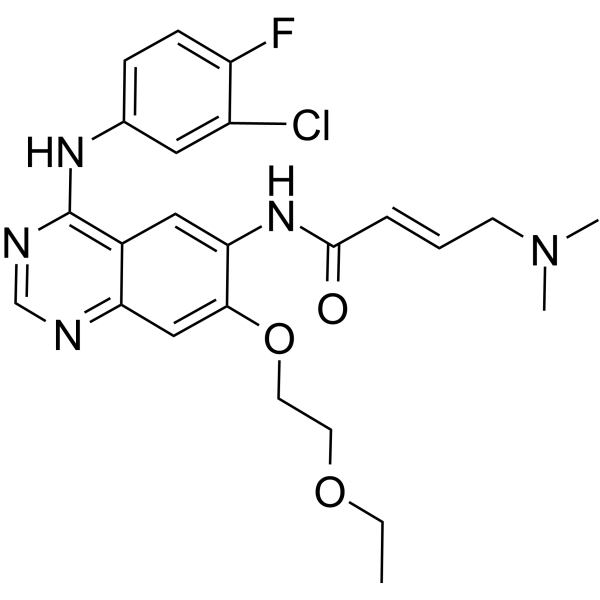EGFR/HER2-IN-4
Modify Date: 2025-10-01 17:12:25

EGFR/HER2-IN-4 structure
|
Common Name | EGFR/HER2-IN-4 | ||
|---|---|---|---|---|
| CAS Number | 1879071-89-2 | Molecular Weight | 487.95 | |
| Density | N/A | Boiling Point | N/A | |
| Molecular Formula | C24H27ClFN5O3 | Melting Point | N/A | |
| MSDS | N/A | Flash Point | N/A | |
Use of EGFR/HER2-IN-4EGFR/HER2-IN-4(compound 6d) is an orally active irreversible dual inhibitor. EGFR/HER2-IN-4 inhibits EGFR with an IC50 value of 0.6 nM and demonstrates potent EGFR kinase inhibitory activities on L858R and T790M mutations. EGFR/HER2-IN-4 has potent antitumor efficacy in vivo and can be used for lung cancer research[1]. |
| Name | EGFR/HER2-IN-4 |
|---|
| Description | EGFR/HER2-IN-4(compound 6d) is an orally active irreversible dual inhibitor. EGFR/HER2-IN-4 inhibits EGFR with an IC50 value of 0.6 nM and demonstrates potent EGFR kinase inhibitory activities on L858R and T790M mutations. EGFR/HER2-IN-4 has potent antitumor efficacy in vivo and can be used for lung cancer research[1]. |
|---|---|
| Related Catalog | |
| Target |
EGFR:0.6 nM (IC50) HER2 |
| In Vitro | EGFR/HER2-IN-4 (compound 6d) (0-10 μM, 72 hours) shows well anti-proliferative activity against human non-small cell lung cancer cell lines NCI-H1975 (T790M), HCC 827 (L858R) and human epithelial carcinoma cell lines A431[1]. Cell Proliferation Assay[1] Cell Line: Human non-small cell lung cancer cell lines NCI-H1975 (T790M), HCC 827 (L858R), Human epithelial carcinoma cell lines A431 Concentration: 0-10 μM Incubation Time: 72 hours Result: Inhibited NCI-H1975 cells, HCC 827 cells, A431 cells with the IC50values of 107 nM,0.2 nM and 20 nM respectively. |
| In Vivo | EGFR/HER2-IN-4 (compound 6d) (orally gavage; 5.1-81.4 mg/kg; for 25 days) has good cancer suppression effect in a dose-dependent manner in the constructed NCI-H1975 tumor xenograft model[1]. Animal Model: BALB/c nude mice, female, 6-7 weeks of age with NCI-H1975 tumor xenograft[1] Dosage: 81.4mg/kg, 20.4mg/kg, 5.1mg/kg Administration: Oral gavage; 81.4mg/kg and 20.4mg/kg for every other day for 25 days; 5.1mg/kg for every day for 25 days Result: Inhibited 95.21% of tumor xenografts growth at 81.4mg/kg, 71.01% at 20.4 mg/kg, and 55.1% at 5.1 mg/kg in nude mice. Animal Model: BALB/c nude mice, female, 6-7 weeks of age with NCI-H1975 tumor xenograft[1] Dosage: 10 mg/kg Administration: Oral gavage; 10 mg/kg; 25 days Result: The pharmacokinetic parameters of EGFR/HER2-IN-4 oral (10 mg/kg) Parameter Oral Tmax 4 h Cmax 92.32 μg/L AUC0-a 1030.9 μg/L*h IV 5 mg/kg half life 6.8 h oral bioavailability 46.1% |
| References |
| Molecular Formula | C24H27ClFN5O3 |
|---|---|
| Molecular Weight | 487.95 |